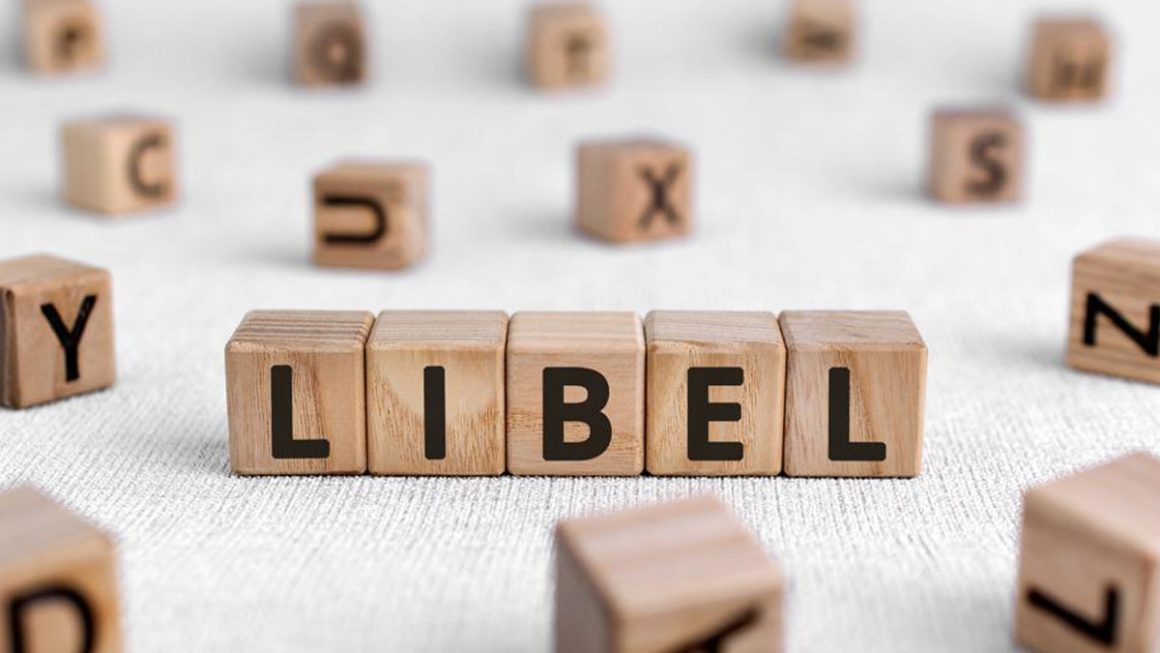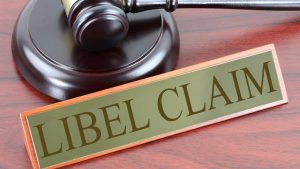What is libel? Libel is when someone writes or publishes something untrue that can hurt the good name of a person, company, product, government, or country. Let’s explore more about what libel is in this article.
Libel is like spreading rumors, but in writing. It happens when people say false and harmful things about someone, making others believe bad stuff about them. It’s a way of talking or writing that can really damage a person’s reputation, or how others see and think about them.
Libelous statements are like telling untrue things as if they’re real, and this can really hurt how people see and think about the person or thing being talked about. It’s when someone says things that can damage the good reputation of someone or something.
Before we explore the element of libelous statements and discover some notable examples of libel cases, let’s first answer the primary question, “What is libel?”
What is libel?
What is libel? To prove something is libel, two important things need to happen. First, what is said must be shown to be not true. Second, it can’t just be talked about privately; it has to be shared with others. This makes libel different from regular gossip or private talks, which might harm a person’s reputation but don’t follow the specific rules for saying something is legally wrong.
To show something is libel, you have to prove that the untrue words actually hurt the person being talked about. This harm can happen in different ways, like messing up work relationships, losing money, or feeling embarrassed in front of others. The person complaining (plaintiff) has to connect the untrue words directly to the harm they suffered for the libel case to work.
But sometimes, people can defend themselves against a libel claim. If what they said is true and can be proven, it’s a strong defense. Also, in certain situations like legal talks, there’s something called privilege that can protect what is said. For famous people like celebrities or politicians, it’s even harder to prove libel because they not only have to show the statement is false but also that it was made on purpose to hurt them.
Libel rules are different in various places, and what’s considered as libel can change based on the laws there. These rules try to find a good balance: they want to protect people from untrue and harmful things said about them, but they also want to make sure people can freely express themselves and talk openly. Figuring out if something is libel can be tricky because it involves looking closely at the specific situation and what was said.
What elements make a statement actionable as libel?
Libel is when someone writes untrue things that can hurt how people see a person, a group, or a thing. To say it’s libel, a few things must be true. The untrue thing must be written down, it has to really hurt the person or group, and there are some ways to defend against being accused of libel.
- False statement
- Publication
- Proof of harm
- Defenses against libel
- Special considerations for public
- Jurisdictional variances
False statement:
For something to be called libel, the significant decision is that it must be a bogus explanation. The individual who is wounded by the explanation (the offended party) needs to show that information exchanged isn’t correct. On the off chance that information disclosed is valid, it’s a decent guard against being blamed for criticism since genuine things aren’t generally viewed as harmful along these lines.
Publication:
Libel is when someone says untrue things about someone or something, but it’s not just talking privately—it’s telling others. To be called libel, these untrue things must be shared with people other than the person talking and the one being talked about. This rule helps separate it from private talks that might hurt a person’s reputation but don’t follow the special legal rules for saying something is wrong.
Proof of harm:
To prove something is libel, the person complaining (plaintiff) needs to show that the untrue words actually hurt their reputation. This harm can happen in different ways, like messing up work relationships, losing money, or feeling embarrassed in front of others. Connecting the untrue words directly to the harm suffered is really important to make a libel case work.
Defenses against libel:
People can defend themselves against a libel claim in a few ways. If what they said is true and they can prove it, that’s a strong defense because true things usually aren’t considered hurtful. In certain situations, like talking during legal proceedings or in protected conversations, there’s something called privilege that can protect what is said. For famous people, like celebrities, it’s even harder to prove libel because they not only have to show the statement is false but also that it was made on purpose to hurt them.
Special considerations for public figures:
Famous people like celebrities and politicians have a harder time proving libel, which is when someone says untrue and harmful things about them. To win, these famous folks not only have to show the statement is false but also that it was made on purpose to hurt them. This is because we want to allow free speech and talking openly in public, but there’s still a way to deal with untrue and hurtful statements about famous people.
Jurisdictional variances:
Libel rules change in different places, and what’s counted as libel can be different depending on the local laws. To figure out if something is libel, you need to know the specific rules in that area. Different places might have different things to think about, ways to prove something, and ways to defend against being accused of libel.
What constitutes libelous statements?
Figuring out what counts as a mean statement (libel) means looking for things that make the words hurtful, not true, and damaging to someone’s reputation. To say something is libel, you check if it’s false, if others hear it (publication), if it causes harm, and how it’s said.
- Harm to reputation
- Unprivileged nature
- Public figures and actual malice
- Defamation per se
Harm to reputation:
For something to be called libel, the untrue words must really hurt the person or thing being talked about. This harm can happen in different ways, like messing up work relationships, losing money, or feeling embarrassed in front of others. To show its libel, the person complaining has to connect the untrue words directly to the harm they suffered.
Unprivileged nature:
Libelous statements are usually not protected, but there are some special talks (privileged communications), like in legal situations, that can’t be used in defamation claims. If the talk is not special (unprivileged), it can be legally challenged if it meets the other rules for being called libel.
Public figures and actual malice:
When famous people like celebrities or politicians say someone lied about them, they have to prove it more. It’s not just showing the lie is false; they also need to prove that the person who said it knew it was untrue or didn’t care about the truth. This way, we balance the freedom to speak openly with a way to deal with untrue and hurtful things said about public figures.
Defamation per se:
Certain things people say are automatically seen as hurtful without needing to prove they cause harm. We call these things “defamation per se.” If someone falsely accuses another of a crime, says they’re not good at their job, or harms their business in certain ways, these statements are automatically seen as harmful to the person’s reputation.
In what forms can libel occur?
Libel is when untrue and harmful things are written and shared about a person, group, or thing. It’s important to know the different ways libel can happen to understand how these hurtful statements can spread.
- Printed media
- Broadcast media
- Online platforms
- Emails and electronic communication
- Published photographs and images
- Advertisements
Printed media:
In newspapers, magazines, and pamphlets, people can say untrue and harmful things about someone or something, and that’s called libel. This includes articles, opinions, or ads that spread false and damaging info. The problem is, because these things are printed and reach a lot of people, the harm caused by libel can be big.
Broadcast media:
Libel can happen on the radio and TV when people say untrue and hurtful things during interviews or news reports. Because these things are not just written but also heard and seen, they can affect a lot of people.
Online platforms:
In the online world, as via online entertainment, web journals, and discussions, individuals can express false and mean things, and that is defamation. At the point when these misleading assertions are posted on the web, they can rapidly contact loads of individuals all over the planet, making the damage to somebody’s standing far more detestable.
Emails and electronic communication:
Libel can happen through electronic messages like emails or texts when people say untrue and harmful things. If these messages are shared with others, it can still be considered libel. The problem is that it’s easy to forward electronic messages to more people, making the harm caused by libel even bigger.
Published photographs and images:
Sometimes, pictures with untrue and harmful captions or stories can also be a form of libel. If a photo in a newspaper, magazine, or online says things that aren’t true and hurt a person’s reputation, it could lead to a libel claim.
Advertisements:
Ads, whether in newspapers, on TV, or online, can have untrue and hurtful things. If an ad says false stuff about a rival’s products or hurts someone’s reputation with untrue info, it might end up in legal trouble because of libel.
What are the legal ramifications of libel?
If someone is caught saying untrue and hurtful things about others (libel), there can be big legal consequences. This might mean they have to pay money, face penalties, or deal with other consequences to make up for the harm caused by their hurtful words.
- Civil lawsuits
- Compensatory damages
- Punitive damages
- Injunctions
- Retraction or apology orders
- Defenses and immunities
- Legal costs and attorney’s fees
Civil lawsuits:
On the off chance that somebody expresses false and terrible things about someone else (libel), the individual who’s harmed can prosecute them in what’s known as a common claim. In this claim, they could want cash to compensate for the damage done to their standing. To win the case, the individual who’s harmed typically needs to show that information disclosed is bogus, that others found out about it, and that they truly endured as a result of it.
Compensatory damages:
On the off chance that somebody wins a slander case in court, the individual who expressed false and pernicious things could need to pay cash to the person who got injured (offended party). This cash is called compensatory harms, and it’s intended to compensate for the genuine mischief brought about by the bogus and harming explanations. It could cover things like losing money, damage to reputation, feeling upset, and other tangible or intangible losses.
Punitive damages:
At times, assuming the individual who expressed false and frightful things (respondent) accomplished something genuinely terrible, the court could make them pay additional cash, and this is called reformatory harms. It resembles a discipline for their genuinely terrible way of behaving, and it’s intended to prevent others from doing likewise. Whether this additional discipline is permitted relies upon where you are and the subtleties of the circumstance.
Injunctions:
If someone is saying untrue and hurtful things about another person, the court might tell them to stop, and this is called an injunction. It’s like a rule from the court saying, “You can’t keep spreading those untrue and harmful words.” This is done to try and stop more harm to the person being talked about.
Retraction or apology orders:
If someone says something untrue and hurtful about another person, the court might tell them to say sorry in public or fix what they said. This is to help undo the harm caused by the untrue words and to make sure everyone knows the truth.
Defenses and immunities:
People accused of saying untrue and hurtful things (defendants) in libel cases can say they didn’t do anything wrong using different defenses, like saying what they said is true, or they had a good reason to say it. If these defenses work, it means they’re not in trouble. Also, in some places, there are special rules that protect certain types of statements, like those made during official talks or by certain public groups.
Legal costs and attorney’s fees:
On the off chance that somebody loses a slander case since they expressed false and destructive things, they could need to pay for all the legitimate stuff, similar to the next individual’s legal advisor charges. Like an additional expense for the individual got discovered making statements that aren’t correct.
What defenses exist against libel claims?
Saying untrue and hurtful things about someone (libel) can get you into big legal trouble. You might have to pay money, face penalties, or deal with other consequences to make up for the harm caused by your hurtful words.
- Truth as a defense
- Privilege
- Opinion and fair comment
- Consent
- Statute of limitations
- Innocent dissemination
- Public figure defense
Truth as a defense:
The best way to defend against libel claims is by telling the truth. If the person accused of saying untrue and hurtful things can prove that what they said is true and can be proven, it’s a powerful defense. In cases like these, telling the truth is usually enough to protect them because defamation, which includes libel, is all about false statements that hurt someone’s reputation.
Privilege:
Sometimes, people can defend themselves from libel claims if they said certain things in special situations called privilege. There are two types: absolute and qualified. Absolute privilege protects statements made during official events like court or government meetings. Qualified privilege can happen when someone has a good reason, like a legal, moral, or social duty, to say something, such as giving a reference for someone at work.
Opinion and fair comment:
Usually, you’re allowed to say what you think about things that matter to the public, and it’s protected from libel claims. But, if you say your opinions like they’re facts and they can be proven false, you might get in trouble for libel. So, it’s important to be clear about whether you’re stating your opinion or stating something as a fact when talking about important things.
Consent:
If the person who’s being talked about in possibly hurtful statements said it was okay to share those things, it can be a defense against libel claims. Consent means they agreed to let the information be shared, and sometimes, it can mean the person talking is not in trouble for saying those things.
Statute of limitations:
Libel claims, like other legal complaints, have a time limit called a statute of limitations. This means there’s a specific time after something happens when a person can file a lawsuit. If too much time passes, the person who might have been hurt by libel might not be allowed to take legal action. The time limit can be different depending on where you are and what the complaint is about.
Innocent dissemination:
Sometimes, people who share things that might be hurtful (like libelous material) can say they didn’t know it was bad, and this is called innocent dissemination. It’s a defense they can use if they had no idea the stuff they shared was hurtful and had no reason to think it was.
Public figure defense:
Famous people like celebrities or politicians have a tougher time proving libel. To win, they not only have to show the statement is false but also that the person who said it knew it was untrue or didn’t care about the truth. This is because we want to allow free speech and talking openly about public figures, but there’s still a way to deal with untrue and hurtful statements.
How to avoid making libelous statements?
To communicate in a good and fair way and avoid getting into trouble with the law, it’s important not to create or spread untrue and hurtful things about others. Following some rules and good practices can help make sure we talk about others in a way that’s respectful and won’t cause legal problems.
- Verification of information
- Clear distinction between facts and opinion
- Responsible journalism practices
- Use of disclaimers
- Avoiding unsubstantiated claims
- Consulting legal counsel
- Understanding defamation laws
- Encouraging open dialogue
- Ethical considerations
Verification of information:
Before talking about someone or something, it’s really important to check if what you’re saying is true. Make sure the details are accurate by checking reliable sources. Saying things that aren’t true is a big reason why people might get into trouble with libel.
Clear distinction between fact and opinion:
When you talk about things, make it clear if you’re stating facts or just sharing your opinion. Opinions are okay because everyone has the right to say what they think. But if you make it sound like your opinion is a fact, you might get in trouble with libel. So, it’s important to be clear about your personal viewpoint to avoid causing confusion.
Responsible journalism practices:
People who write news and work in the media should be responsible and follow good practices. This means checking information from different sources, giving a fair view of things, and letting people respond to accusations before sharing the news. Doing journalism in an ethical way helps make sure they don’t accidentally share false and hurtful information.
Use of disclaimers:
If you’re talking about things that are not for sure or might be controversial, it’s good to use disclaimers. Disclaimers are like saying, “Hey, this is just what I think or what I heard; it might not be 100% true.” They don’t give total protection, but they can help show the context and nature of what you’re saying.
Avoiding unsubstantiated claims:
Before saying something about someone or something, make sure you have strong evidence to prove it’s true. If you can’t confirm it with good proof, it’s better not to share it. Talking without solid evidence can get you into trouble with libel, where people might say you’ve spread false and harmful information.
Consulting legal counsel:
If you’re not sure if what you want to say is okay, it’s a good idea to talk to a lawyer. Lawyers can give advice on whether your words might cause legal problems and help you avoid making mistakes. This is especially important when you’re dealing with serious or sensitive situations.
Understanding defamation laws:
Learn about the rules about saying things about others where you live. Knowing these rules can help you talk in a way that’s okay and doesn’t break any laws. Every place might have different rules about what’s allowed and what’s not when talking about others, so it’s good to know the rules where you are.
Encouraging open dialogue:
If you have a problem with someone, it’s better to talk to them directly instead of saying things in public. Having open conversations can help solve issues and stop problems from getting bigger. It’s a good way to prevent saying things that could hurt someone’s reputation.
Ethical considerations:
When you talk to others, think about how your words might affect their reputation and everyone around. Make sure what you say is true, fair, and respectful to avoid causing harm. Always try to communicate in a way that’s honest and fair to everyone.
What are examples of notable libel cases?
Libel cases, where people say things that hurt others, have played a big role in making rules about what’s okay to say. Some important examples of these cases have helped set the standards for how we understand and follow these rules.
- New York Times Co. v. Sullivan (1964)
- McLibel case (1997 – 2005)
- Galloway v. Telegraph group ltd (2004)
- Lange v. Atkinson (2000)
- Reynold v. Times Newspapers ltd (2001)
- Hill v. Church of scientology of Toronto (1995)
New York Times co. v. Sullivan (1964):
A really important case in the U.S. Supreme Court decided that for public officials or famous people to win a defamation case, they have to show that the untrue things said about them were known to be false or said without caring if they were true. This case set a high standard to prove defamation for public figures.
McLibel case (1997 – 2005):
In a big fight between McDonald’s and people who cared about the environment in the UK, McDonald’s said they were hurt by a leaflet made by the activists. The court agreed that some things in the leaflet were harmful, but it also said the activists were right about certain points. This case showed how powerful companies and regular people can clash in libel cases, where they argue about saying hurtful things.
Galloway v. Telegraph group ltd (2004):
A British politician named George Galloway won a case against a newspaper called the Telegraph. The newspaper said he got money from the leader of Iraq, Saddam Hussein, but the court decided the newspaper was wrong. This case showed how important it is for news to be accurate and properly checked, especially when it’s about serious accusations.
Lange v. Atkinson (2000):
In Australia, there was a case where the High Court said it was okay for a journalist to report what a politician said if it was true and fair. The court decided the journalist had a responsibility to share the politician’s statements, and as long as they did it fairly and accurately, they were allowed to do it under qualified privilege.
Reynolds v. Times newspapers ltd (2001):
In the UK, there was a case that made a rule called the Reynolds defense. This rule says that if a news report is made responsibly and is about something important to the public, it might be protected from libel claims. It means journalists can avoid trouble if they report on important things in a careful and responsible way.
Hill v. Church of scientology of Toronto (1995):
In Canada, the Supreme Court said that people can defend themselves by saying their comments are fair, even if the facts they’re based on are wrong. The court explained that the comment should still look like an opinion, and the person saying it has to genuinely think it’s true.
Conclusion:
What is libel? Knowing about libel is important for people who talk in public, like in the news or online. Libel is when someone writes false things that can hurt the reputation of a person or a group. For it to be considered libel, the false statement must be shared with others and cause real harm. Legal consequences for libel can include being taken to court, having to pay damages, being told to stop spreading the false information, or having to say sorry publicly. Ways to defend against libel claims include telling the truth, having a good reason, expressing opinions, and following good journalism practices.
To make sure you don’t say things that could get you in trouble, it’s important to check if they are true, tell when you’re giving your opinion, and follow good journalism practices. Using disclaimers, which are like saying, “I’m not sure about this,” can also help. If you’re ever unsure, it’s a good idea to talk to a lawyer. Some big legal cases, like New York Times Co. v. Sullivan and McLibel Case, have helped make the rules about what’s okay to say, stressing the need to report responsibly and setting important examples for the law.



